The moment from which Western Europe began to take shape
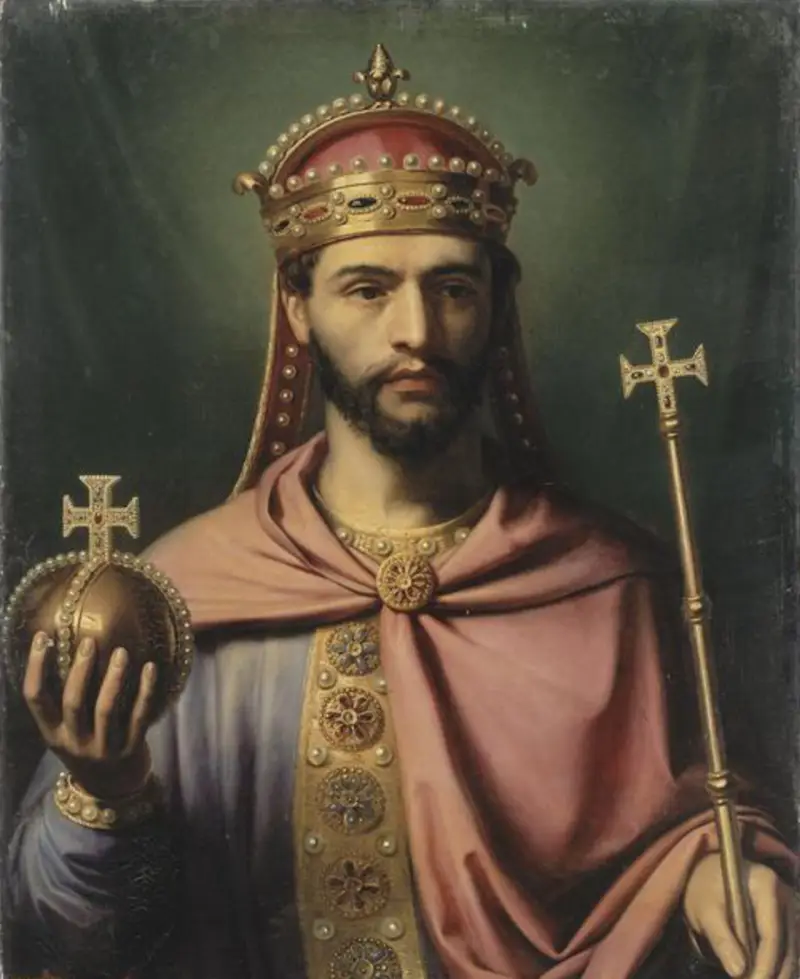
Louis the Pious
In the ninth century, three brothers who fought for the empire made peace and divided Western and Central Europe among themselves. As a result of this division, the territories of France, Germany and Italy appeared.
Charlemagne and Louis the Pious
First let's dive into history, so that it is easier for us to understand the situation. And let's start with a brief description of the grandfather of these three brothers who divided the empire.
Charlemagne is the king of the Franks, the king of the Lombards and simply the father of Europe. He is also called the Emperor of the West. This man had leadership qualities and was the first among the first in those difficult and dark times. His goal was to revive the Roman Empire. During his almost half-century reign, he united almost all of central and western Europe, and the new state began to be called the Carolingian Empire. Gaul, part of Spain, and Italian lands submitted to Charles; he crushed the Saxons and suppressed the Bavarians. True, he did not have enough resources to hold such a large territory.
Charlemagne had three sons, among whom he divided his territory. The Carolingians followed the traditions of the Franks - if you have several sons, then you divide your possessions between them. Power was not completely inherited by the eldest son. However, the two eldest sons die, and the entire empire goes to the last one - Louis. In 813, he was crowned by his father himself, a year before his death.
According to the chronicles that have reached us, Louis was a good man, pious. But he was clearly not the one who could rule such a large empire. For his piety and concessions to the church, he received the nickname Pious. He was also called Carefree for his simple character and good nature.
The beginning of Louis's reign was not remembered for anything special. The emperor had three sons - Lothair, Pepin and Louis. He began to involve the first in politics three years after ascending the throne. Lothair became co-ruler of the Carolingian Empire, Pepin received Aquitaine, Gascony, Louis received Bavaria, Carinthia.
But the younger brothers still, according to the decree, remained under the general suzerainty of the elder. If one of them died, then his possessions were divided between the remaining brothers, and not passed on by inheritance. The brothers were satisfied with the situation; it seemed that the empire was under control and was not in danger. But, as often happens, love changed everything.
Prerequisites for war
A year after the division of possessions, the wife of Louis the Pious died. After the death of Irmengard, the emperor fell into depression and wanted to go into a monastery, leaving the throne.
However, he was persuaded to stay, and they found him a second wife, Judith. The Emperor loved her very much, and in 823 she gave birth to his son Charles. Louis was easy to manage, he yielded to his wife, and she insisted that he also allocate lands to their son, like his older brothers. The husband succumbed and signed Charles Alemmania and a couple of other areas in 829.
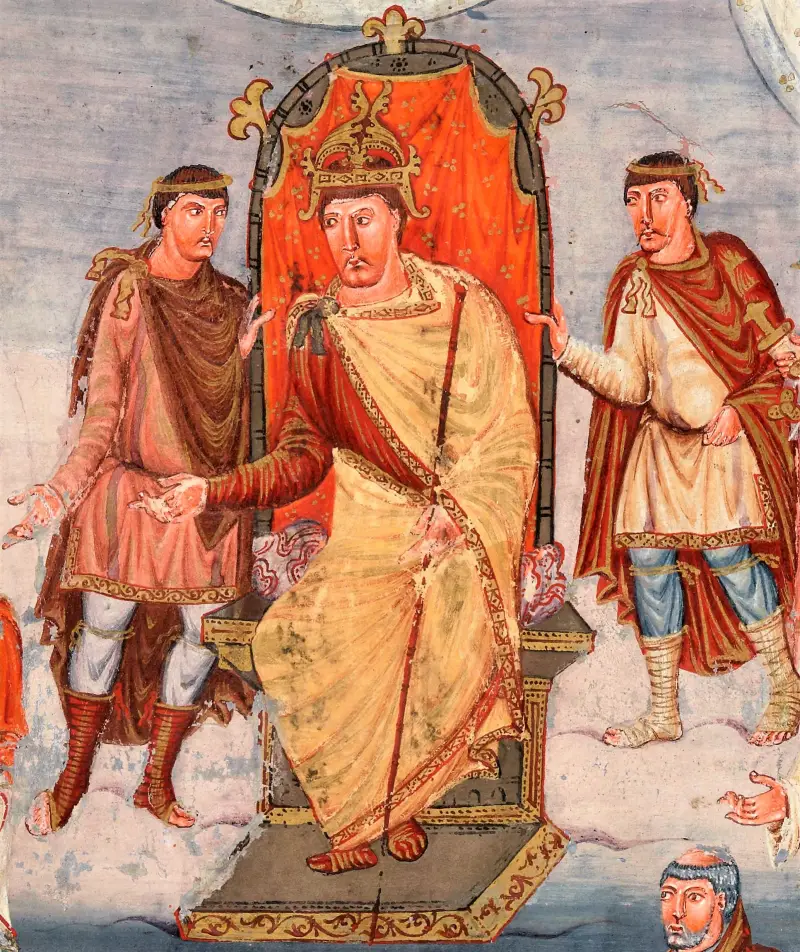
Karl Baldy
Of course, this did not suit the older sons. In addition, at the palace there were many dissatisfied with Judith, who weaved her intrigues and removed many dignitaries from power. Lothair was among them, he felt that the empire could slip out of his hands. Therefore, he teamed up with Pepin against his father.
Louis the Pious was easily overthrown. However, Pepin realized that his brother now had complete power. He turned to his mother's younger brother Louis, and they brought his father back at a meeting of the Diet, where there were no Lothair supporters. The eldest son accepted this decision and retreated, afraid to start a war.
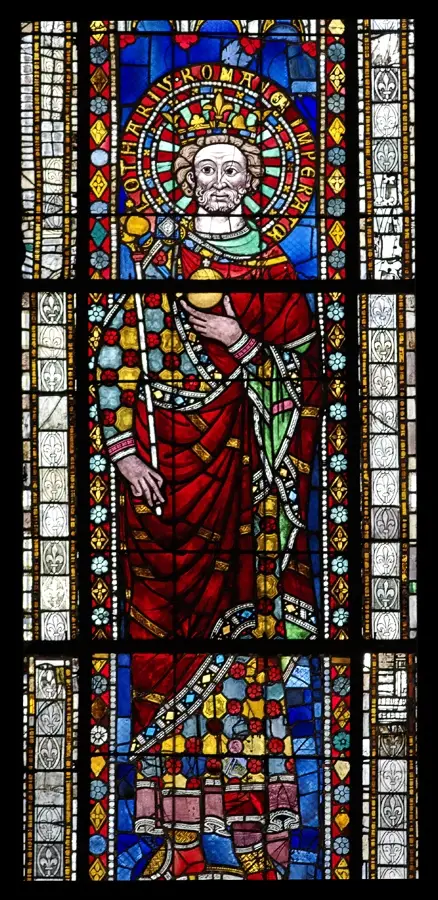
Mosaic depicting Lothair
The father forgives his children, but takes away part of their lands in favor of the youngest Charles. Pepin refused to obey the emperor, avoided meeting him, was taken into custody, and escaped. The year 831 turned out to be eventful for him. In 832, Pepin was deprived of Aquitaine, recaptured, he again ran away and rebelled against his father.
In 833, Lothair joined his brother, followed by his third son Louis, and they began to seize power. The Field of Lies is a clash of two armies. Louis the Pious met his three eldest sons in a field in Alsace. A battle was expected the next day, but at night most of the emperor’s army fled to the rebel sons. Louis disbanded the rest of his army and surrendered himself.
A humiliating procedure awaited the former emperor. First he was imprisoned in a monastery. Then he was handed a list of charges, with which he was forced to agree. But the environment considered such humiliation undeserved and biased.
A few months later, the second and third sons sided with their father. And at the end of winter 834, they decided to put Louis the Pious back on the throne, and he made peace with them. Lothair opposed it; at first his army won skirmishes against his father’s supporters, but in the summer of that year it was defeated. They forgave Lothair, left Italy behind him, but deprived him of co-ownership of the Carolingian empire.
War of the Three Brothers
Pepin died in 838, and Louis the Pious himself died in 840.
Who should sit on the throne of the empire?
None of the three remaining brothers was going to back down. They were also joined by Pepin's son, Pepin II. He teamed up with his uncle Lothair against Louis and Charles. The last two swore in front of the troops that they would definitely stop Lothair and end the civil war. The oath was in two languages - Romance (a prototype of French) and Germanic (common in the east of the Carolingian Empire). The text of the oath of 842 has survived to this day and became the first document in the history of Germany and France.
The following year, the two warring parties met in Verdun and signed a treaty. According to him, the empire was divided between three brothers. Lothair remained emperor. True, this title had a formal meaning, since the younger brothers did not obey the older brother. So, he got the central part of the empire from the North to the Mediterranean Sea. This is the north of Italy, Holland, Lorraine, which he named after himself, Alsace, Burgundy, Switzerland. Lands that were not connected to each other, and pretty soon they fell apart into separate parts.
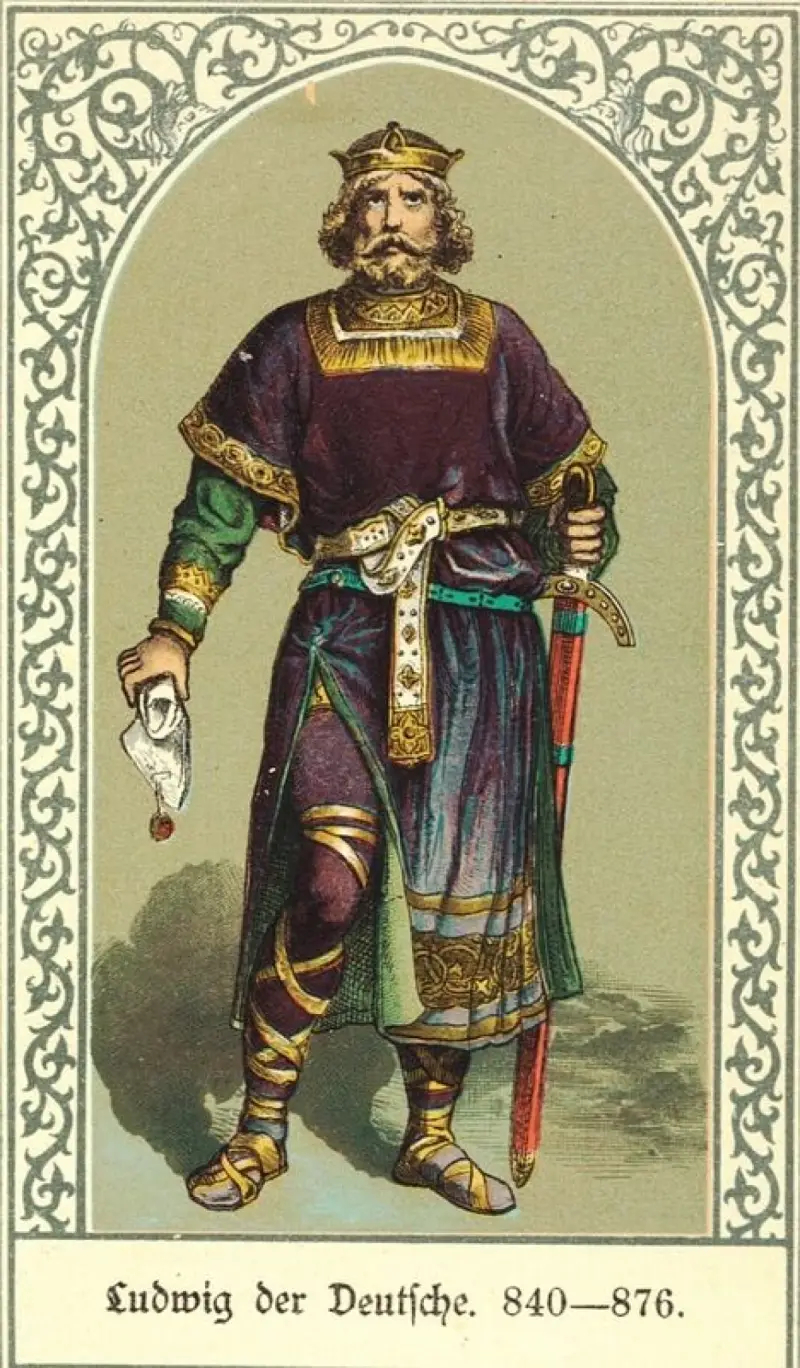
Louis the German
Louis inherited the east of the empire - most of what is now Germany. Louis received the nickname the German and is considered the founder of the German nation. The younger brother Charles the Bald received the western part of the empire - almost the entire territory of present-day France.
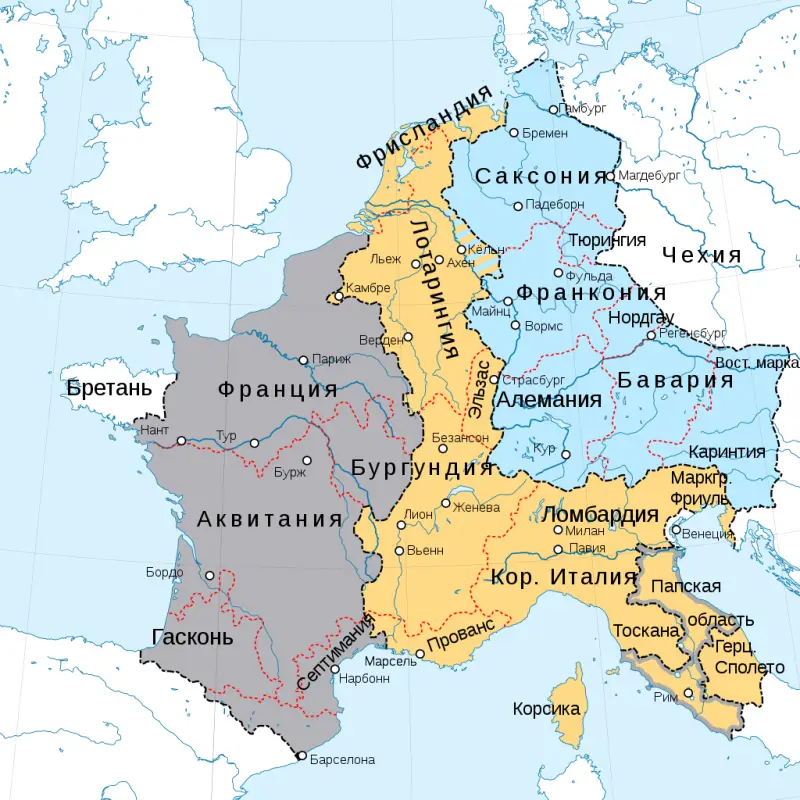
Division of territories according to the Treaty of Verdun. The gray part is the territory of Charles the Bald, yellow – Lothair, blue – Louis the German
After 37 years, the territory of the deceased Lothar will be divided by brothers and nephews, which will finally destroy the huge Carolingian empire, which Charlemagne had so hard to assemble.
The modern political map of Europe owes its appearance to the Treaty of Verdun. This document outlined the territories of France, Germany, Italy and became the impetus for their development and global influence on world history.
Information